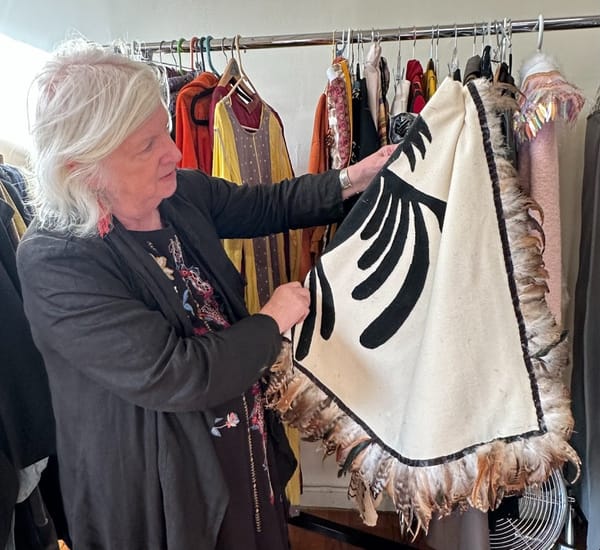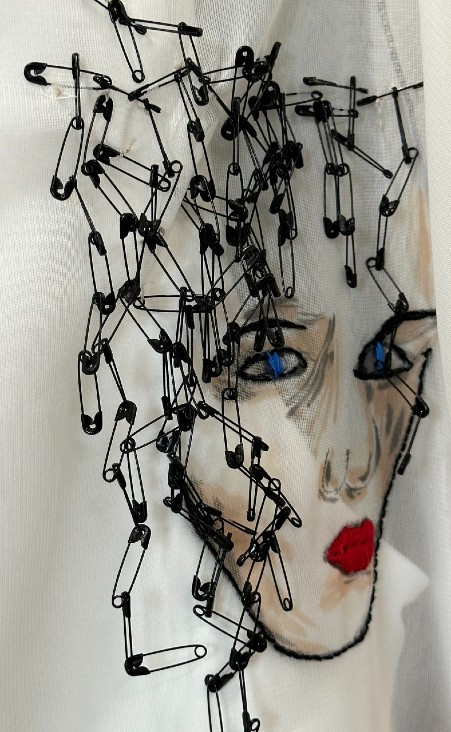Doreen Breen’s Upcycled Coats Are Good For The Soul
The textile artist fashions “soul coats” in collaboration with her clients that help bring their “soul forward.”

The textile artist fashions “soul coats” in collaboration with her clients that help bring their “soul forward.”

Textile artist Doreen Breen points out the many textures and materials she uses in her work, including this piece trimmed with feathers. Photos by Jeannette Brodeur
From a very early age growing up in Scotland, Doreen Breen, 74, dreamed of being a fashion designer, but it wasn’t until her fifties, when she was laid off from a corporate banking job, that she began to use textiles as a medium of creative expression.
Now, as the owner and designer for Soul Threads, located in Whiting Mills in Winsted, Connecticut, Breen uses natural materials to create diverse, colorful, one-of-a-kind wearable art clothing and accessories.
“For me, clothing has always been an important form of expression,” she explained. “As a woman working in a male-dominated field, I was told I had to wear a black or blue suit with a pale pink shirt.”

Breen cuts fabric for a future project in her Whiting Mills studio in Winsted, Connecticut.
“I feel strongly that what we wear has a direct impact on us,” Breen emphasized. “It’s important to find clothes that make you feel empowered, beautiful and strong.”
The passion Breen has for her art is also driven by her disdain of “fast fashion,” which is inexpensive, mass-produced clothing that uses toxic materials in its production, encourages landfills, releases microfibers into the air and is harmful to humans and animals.
Using used or vintage clothing, Breen deconstructs pieces, re-sews them and adds vintage fabrics, ethnic textile panels and trims that are either upcycled or her own creations.
She admits that her fanciful pieces border on being costumes. Her beautifully detailed work incorporates felting, hand-knitting, free-form crocheting, weaving, embroidery, stitching as well as several different hand dyeing techniques.
While she uses her own unique vision to create most of her pieces, Breen does collaborate with her clients to create very personal “soul coats” which she believes therapeutically help to “bring their soul forward.” These special coats often feature a treasured memento from a deceased loved one.
Breen starts with a used coat she’s found or one that the person offers for the project. She works directly with the client to discover their favorite colors and textures. Then she sketches their ideas and pulls all the pieces together. The client must trust Breen completely to create this very unique and personal piece.
“I try different things and the coat speaks to me,” Breen said. ”I know when it’s right. I sense it.”

Breen creates detailed notes, bits of inspiration and sketches for many of her pieces including her Joan of Arc design that is part of her “Warrior Women” collection.
Breen once created a coat for a woman whose son died of an overdose and her father had passed away at about the same time. Using ties they wore, Breen stitched them together to make a yoke on the back of the coat and fastened a piece of a treasured pillow inside the coat. Sometimes she hides a part of the piece inside the lining just for that person to know it’s there.
“The experience and the finished coat can be very healing for someone and also very raw,” Breen said. “It’s also spiritual. It represents those people for you. It’s always with you. It gives you comfort.”
Breen has created five or six soul coats, but she keeps no photos of them because each coat is not only one of a kind but so intensely personal to the client. “I don’t actually believe they’re mine,” she said. “They don’t belong to me.”
The cost of a soul coat really depends on how long it takes her to create it, but Breen estimates the price for each coat can range anywhere from $50 to $300.
When she is creating a soul coat, Breen devotes all of her time and energy to that special single piece. “Working on these projects is incredibly special and gratifying,” she said.
Her other current project is a special collection of outfits she’s created called “Warrior Women.” The project focuses on “bringing forth the stories of warrior women throughout history” while allowing Breen to “showcase wearable art representative of the particular women and their cultures.” Female empowerment is an ongoing, powerful theme in Breen’s work and in her life. Suffragist Harriet Tubman, France’s Joan of Arc, Egyptian Queen Hatshepsut and female Japanese samurai warrior Hangaku Gozen are just some of the women she’s paid tribute to.
As a little girl, Breen spent hours sketching clothes and fashion only to have her mother rip up her artwork, but she did find some comfort in knitting and embroidering with her mom and her grandmother, who taught her to knit at age seven. When Breen was growing up in the 1950s in Scotland, knitting and sewing were not considered art but as necessary, practical skills taught in schools.
When she was 14, Breen and her family moved to the United States. For almost 30 years, She worked in corporate banking, advancing to vice president of corporate security for four states. When the bank she worked for merged with another, she was laid off with two-and-a-half years of severance pay. What seemed like a setback to Breen was actually a blessing in disguise.
Her then-teenage daughters, Mayuri and Katherine, as well as her husband, Terry, encouraged her to use the time to explore her creativity that was tamped down for so long. “It was time to do something just for me,” Breen said. She took noncredit classes in textiles at the Fashion Institute of Technology in Manhattan and learned to paint on silk and the art of shibori, a Japanese dyeing technique.
In 2011, she opened the Phoenix Rising Art & Healing Center in Thomaston, Connecticut. While Breen loved the artist community she created, she soon realized she was so involved with the business that she didn’t have time to be an artist herself. In 2013, Breen decided to close the center and focus solely on her art, which she’s done for the last 10 years in different spaces. Since her recent move to a large, bright studio space in Whiting Mills, Breen now feels completely at home.

